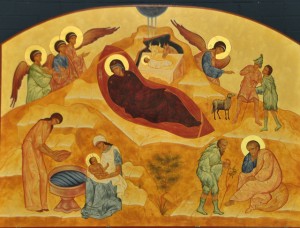
I hope that this finds you reveling in the mystery of Christmas. We are only halfway through the 12 days, so let’s keep at it.
Pour yourself a mug of eggnog or mulled wine and think about it:
The eternal God has taken human flesh and dwells among us!
That is far too big a miracle to be done with in a day.
Reveling in the Mystery of Christmas
If you want something to nudge your reflections, consider these two hymns from the Orthodox worship service for Christmas Eve, “the Vesperal Liturgy of St. Basil.” (Both of the hymns are translated by Fr. Seraphim Dedes, and offered to to the churches through his inimitable “Digital Chant Stand.”)
Come, let us rejoice in the Lord, as we tell about this mystery.The middle wall of separation has been broken down;the fiery sword has turned back,the Cherubim permits access to the tree of life;and I partake of the delight of Paradise,from which I was cast out because of disobedience.For the exact Image of the Father,the express Image of his eternity,takes the form of a servant,coming forth from a virgin Mother;and He undergoes no change.He remained what He was, true God;and He took up what he was not,becoming human in His love for humanity.Let us cry out to Him:“You who were born from a Virgin, O God, have mercy on us.”
There is a lot there to meditate on. This is not just the cute scene of a baby in a manger. Nor is it a foreshadowing of Christ’s death on the cross.
The Orthodox look on Christmas and see it for itself: the incarnation of God.
Christmas reverses the destruction caused by sin and begins our restoration — both restoring the Image of God in us and restoring us to the life intended in paradise.
Like in some Western hymns and carols, all are pictured bringing their gifts. But check this out:
What shall we offer you, O Christ,because you have appeared on earth as a man for our sakes?For each of the creatures made by you offers you its thanks:the Angels, their hymn;the heavens, the Star;the Shepherds, their wonder;the Magi, their gifts;the earth, the Cave;the desert, the Manger;and we, a Virgin Mother.God before the ages, have mercy on us.
The biblical cast of angels, magi, and shepherds all bring their gifts. But rather than adding a little drummer boy, the hymn expands the cast to include the creation itself: the heavens offer a star and the earth hosts the Holy Family in a cave (not a barn as in Western art).
All creation takes its part in welcoming God in human flesh, as all creation will benefit from the salvation he brings.
And we too take part, bringing our gifts.
In a sense we have already done so: humanity itself has offered the Virgin Mary to be Christ’s holy Mother.
But the question of the opening line invites us to consider it individually:
What shall we offer you, O Christ?
The answer is in prayers that occurs often in Orthodox worship. And this is also my prayer for you, dear reader, this Christmastide:
In peace, let us pray to the Lord.
(Lord, have mercy.)
For the peace from above and the salvation of our souls, let us pray to the Lord.
(Lord, have mercy.)
For peace in the whole world, for the stability of the holy churches of God, and for the unity of all, let us pray to the Lord.
(Lord, have mercy.)
…let us commit ourselves and one another and our whole life to Christ our God.

Thank you for pulling that together. I’ve not thought about us already having offered up our humanly “fleshiness.” So, I liked it when you wrote,
“In a sense we have already done so: humanity itself has offered the Virgin Mary to be Christ’s holy Mother.”
In a way, this compliments the idea that every Eucharist is really an offering up of ourselves to God.
Also you got me curious: who wrote those hymns? So, I did some research. Here’s what I discovered:
“Come, let us rejoice in the Lord” was written by Patriarch Germanos of Constantinple in the 8th century, and “What shall we offer you, O Christ” was written by Patriarch Anatolios of Constantinople in the 5th century.
Thanks Fr. Dustin. The idea that humanity offered the Virgin Mother is straight out of the hymn, so don’t give me too much credit!
How did you track the authorship of the hymns? It there an app on your Orthodox Decoder Ring?
I simply looked it up in my festal menaion.
You can find it on Amazon here
(We’ll see if I did the link correctly!)
Thank you for this revelry! I’m really enjoying these.
Thanks so much, Eric! I appreciate your affirmation a ton.